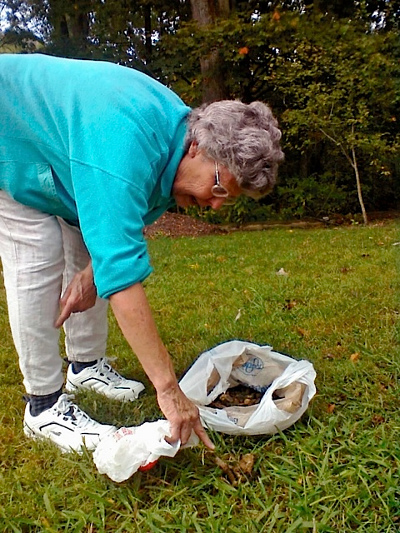
Collecting goose manure for the garden
 Looking
for fertility for your small urban garden? Search no further than
your local golf course or park.
Looking
for fertility for your small urban garden? Search no further than
your local golf course or park.
Canada Geese love these
"lawns" and they camp out on the grass spreading their manure.
Park managers will nearly always be more than thrilled if you scoop
some up (just like bagging your dog's poop during an urban walk) and
bring it home to mix with a high
carbon material like
leaves.
Goose manure is about
77% water and has a fertilizing value of about 2-4-2 when dried.
That means a lot of high quality phosphate, which is hard to find in
plant-based compost. Of course, goose poop is a bit too strong to
apply directly to your plants, but you can either add it to your
compost pile for a dose of nitrogen or mix with mulch for a spring
boost around perennials. Another alternative would be to water
down the goose poop to make a manure tea for feeding house plants,
especially greedy eaters like dwarf
citrus.
While you're fertilizing
your garden, you'll even be helping the local watershed.
Phosphates from concentrated masses of goose poop can cause algae
blooms in nearby waters and end up killing fish and other life.
Scooping poop can keep the water clean and your garden green.
| This post is part of our Tips from the Urban Homestead lunchtime
series.
Read all of the entries: |
Want more in-depth information? Browse through our books.
Or explore more posts by date or by subject.
About us: Anna Hess and Mark Hamilton spent over a decade living self-sufficiently in the mountains of Virginia before moving north to start over from scratch in the foothills of Ohio. They've experimented with permaculture, no-till gardening, trailersteading, home-based microbusinesses and much more, writing about their adventures in both blogs and books.
Want to be notified when new comments are posted on this page? Click on the RSS button after you add a comment to subscribe to the comment feed, or simply check the box beside "email replies to me" while writing your comment.

I haven't, but Mom did, which is why I included it in the lunchtime series. It wouldn't make sense on a large scale, but if you've just got a small city garden like she does, collecting goose poop makes sense.
And she's not the only one. When I was researching the fertilizer value of goose poop, I ran across some folks talking about their Asian neighbors collecting goose poop. In the U.S., we consider so many things waste which are actually high quality fertilizer, while people from China and other parts of Asia seem to be more in touch with free sources of organic fertilizers. If it's good enough for them, it's good enough for us.
Maggie --- Yup. The whole lunchtime series will include photos of her or by her.
Josh --- I can't think why goose poop would be more dangerous than any other kind of manure. Of course, you generally don't touch fresh manure of any sort directly, don't put your fingers in your mouth afterward, and do wash your hands. But I'd say goose poop is probably safer than scooping your dog's poop since dogs are meat-eating mammals and thus are more likely to pass on diseases we can take in.
I'm so sorry to hear about your son's illness! However, the problem was likely the concentration of manure, not the species. If a few dozen chickens had been spreading their manure into the lake, chances are it would have been just as disease-laden.
Geese are a huge problem in areas like that because people feed them, so they've stopped migrating and have increased their populations far beyond the levels the environment can handle. In effect, we've created CAFOs for geese around our lakes and golf courses.
Again, as long as you follow the tips I outline above, handling goose poop is no worse than any other manure. Swimming in poopy water breaks all the rules.
I too have been thinking about using goose poo on the compost heap to enrich it. However, just a reminder, that unlike cows and horses, geese are not vegetarian - they eat fish, worms, slugs etc., so their manure is bound to contain bacteria that could take a long time to decompose to a safe usable level.(I've also seen them eating dog poo!)
I have a good size area in my back yard to spread the manure out so it dries out. Smell doesn't seem to be bad.. Is that not a good idea to "season" it? Is it always best practice to make a compost PILE with it necessarily? I understand heat can help but...